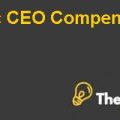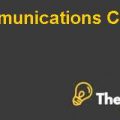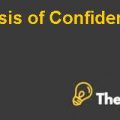
Introduction
PepsiCo is a multinational company that deals in manufacturing and marketing of beverages and food products. The company has been formed by the merger of Pepsi and Frito Lay in the year 1965. PepsiCo has its presence in nearly 200 countries and employs are over 285,000 worldwide. In 2008, the sales of the company had reached up to $108 billion. The current stance for PepsiCo is based on providing healthier lifestyle for kids and offering healthy products to kids at their homes, schools, and their fun places. PepsiCo believes that it may promote their products in targeting kids through different marketing campaigns and to make lives better for kids.
The paper attempts to provide an analysis for PepsiCo through the use of SWOT analysis in deciphering company’s internal analysis, PEST and Porter’s model to understand PepsiCo’s external analysis and industry trends. The paper also attempts to describe company’s consumer buying patterns and the financial ratios of PepsiCo. Furthermore, the paper elaborates the alternative option and provides future recommendations for PepsiCo.
Problem Statement
PepsiCo faces the problem of social and ecological issues with the increased awareness of consumers about obesity and other health related issues. Therefore, the company has three options to consider in order to develop its future strategies. The company can either ignore the health related concerns and can carry its strategies as it has been performing currently, or the company can entirely change its business processes and strategies by forgoing its unhealthy products and focus on producing healthy products. The third option focuses on developing strategies to make unhealthy and bad products of PepsiCo to lower intensity of bad products by focusing on its ingredients and making it slight healthier.
Analysis
SWOT Analysis
Strengths
PepsiCo has a strong brand positioning and has comparatively larger revenue growth than its competitors due to its brand diversification. The company has presence in beverages and as well as in food products. The company has strong brand endorsement through celebrities and other brand ambassadors. PepsiCo has conducted many taste challenges which has revealed Pepsi as most preferred brand by consumers. Total net revenues for PepsiCo remains $43.2 billion in the year 2009, and is considered as the third most consumed beverages after Coke and Diet Coke. The company has a strong marketing and distribution channels, while the new core competency of the company has been focused upon new product development.
Weaknesses
The use of fat, sugar, and salt in its products is highly regarded as a negative factor. Health concerns and the production of unhealthy products is considered as a major weakness of the company (Carroll & Buchholtz, 2014). Due to the awareness of consumers about health related issues, the company has been trying to lobby against health organizations by spending $4.2 million for lobbying expenses which has decreased the revenues for the company. The company is also involved in erupting ecological problems through the emission of greenhouse gases and avoiding nutritious ingredients in its worldwide products. As increased health awareness amongst consumers, it has allowed the company to expand its carbonated drink product line.
Opportunities
PepsiCo can invest its capital in the research and development of new products that are healthy and contains more nutrition than its previous products. Focusing on sustainability while making improved business process that does not increases the effect of greenhouse gases and are environmental friendly. It is an opportunity for the company to change its strategies according to the demands of the market. However, the demand realizes that the company shall expand its product in the category of non-carbonated drinks market. Targeting younger generation with a different motto can increased market share and have first mover advantage.
Threats
The nitrogen revolution is a major threat for PepsiCo as the concept of preparing organic and unhealthier food and beverages have increased dramatically over the year. PepsiCo has a major threat due to the particular concerns because neither of its products are healthier as it has been proved many times by different scientists. The company has also lost a lawsuit for naked juice for mentioning those ingredients which are unhealthy and claiming it to be a healthier product. The other major threat is Coca-Cola which has the largest market share in beverages market. Economic recession has allowed consumers to spend less on the organic foods and more on nutritious diet...................
This is just a sample partial case solution. Please place the order on the website to order your own originally done case solution.
In early 2011, PepsiCo, one of the largest food and beverage companies in the world, is undergoing enormous criticism for his role in the social and environmental issues related to the food system. Major health problems, including obesity, heart disease and diabetes, not to mention the environmental problems, such as excessive packaging and waste contributed CEO PepsicCo's (CEO) to review the company's strategy. General considers that PepsiCo is "responsible for developing solutions to key global challenges, such as obesity." This will require a profound reflection of the positioning of PepsiCo in the market in light of the many products they provide that now contradicts this. The case chronicles comprehensive incommensurability interests of food industry and society. Written for courses in business strategy, business and society, and marketing, the case described the motivation of companies such as PepsiCo, to overcome a major limitation of the growth of food industry, in which precipitated the onslaught of social and environmental issues seen in modern society. Case pushes students to flesh out the strategic options for PepsiCo, which depends on the degree to which a search for solutions to social and environmental issues become central to the basic strategy. "Hide
by Michael Valente Source: Richard Ivey School of Business Foundation 22 pages. Publication date: April 20, 2011. Prod. #: W11097-PDF-ENG













